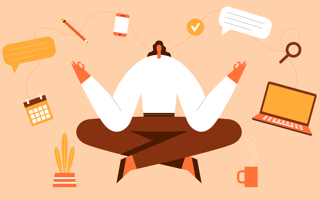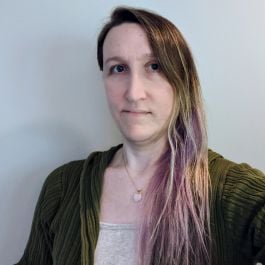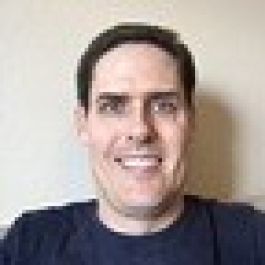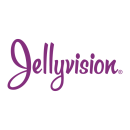Many engineers can picture this scene: Your mind is trained on the task at hand as your fingers furiously tap away at the keyboard, creating a consistent drum of productivity — until you hear the chime of a meeting reminder on your computer.
It’s hard enough for engineers to find their “flow state,” so when this focus time is interrupted, it can feel like hours of efficiency have been lost. That’s why many developers and their teams follow various practices to ensure they maintain a consistent amount of productivity throughout the workday.
Of course, that doesn’t mean it’s possible to eliminate distractions entirely. When Kevin Lilly and his family moved from Chicago to Albuquerque, New Mexico, the principal engineer at Jellyvision may have traded in brutal winters for sweeping mountainscapes, yet one thing remained the same: his children vying for his attention during working hours.
“Working fully remotely at home with young children can be a challenge, but maximizing my core work time, which includes coding and problem-solving, when they’re at school and doing the administrative work when they’re bouncing around nearby helps keep my productivity levels high,” he said.
“Maximizing my core work time, which includes coding and problem-solving, when [my kids are] at school and doing administrative work when they’re bouncing around nearby helps keep my productivity levels high.”
While Lilly does his own part to maintain focus time during the workday, he also receives help from his peers and leaders to accomplish this. He said that his team strives to hold all meetings during the mornings to allow time for heads-down work in the afternoons, while the wider company adheres to a “no-meetings Friday” policy. Both of these practices help Lilly stay in “the zone” and solve complex problems.
Receiving support from others is critical to ensuring engineers can find and maintain a flow state. This is something Ryanne Fox, technical leader of site reliability engineering at Cisco Meraki, has learned over the course of her career. She considers it essential to rely on both her teammates and reliable resources when tackling issues at work.
“It’s important to easily connect with others who can help and have access to documentation that’s clear and accurate,” Fox said.
For Fox, finding a flow state is challenging on its own, but staying in it can be even harder. To achieve consistent productivity, she relies heavily on her laptop’s “focus” mode, a feature that limits which apps send notifications.
“I can best keep a flow by limiting chances for my brain to latch onto something new,” Fox said.
Below, Lilly and Fox share the practices and approaches they employ to find and maintain a flow state.
Cisco Meraki enables people to make powerful connections, whether in business, education, philanthropy or creativity. Cisco hardware, software and service offerings are used to create the internet solutions that make networks possible, providing easy access to information anywhere, at any time.
What are the circumstances in which you do your best work?
I do my best work when I’m thoroughly self-motivated by a task. For me, this can be during an incident when a quick resolution is needed or when there are problems that have challenged others and I can take a fresh look at it and possibly be a hero.
I focus most effectively when my work environment is comfortable, and I’m not stressed or distracted by other things in work or life. I need to feel supported by my team, manager and company. I also need to be able to get the resources needed for a solution without much friction. For me, it’s important to easily connect with others who can help and have access to documentation that’s clear and accurate.
How do you structure your day and workspace to best facilitate getting into a ‘flow state’?
Getting into a flow starts with being in the right job. I love doing site reliability engineering work. I’m very engaged during incidents and enjoy thinking deeply about system design. I’m certain I would struggle to find my flow state doing some other kinds of work. So first and foremost, align your work with your interests so that there are opportunities to find flow.
“Getting into a flow starts with being in the right job. … Align your work with your interests so that there are opportunities to find flow.”
The other important aspect is keeping the flow once you’re in it. The key is preventing interruption and distraction. This is highly individual, but for me, it starts with environmental comfort. I work remotely and get to curate my office space, wear comfy clothes and set the thermostat at the temperature I desire. When I know I’m going to be engaged in a task, I try to take care of hunger, thirst and other needs in advance. If I’m doing deep thinking, I’ll use my laptop’s “focus” mode to limit which apps might interrupt me.
Have any resources changed your perspective on the process of doing creative work?
Rick Rubin’s book The Creative Act was really interesting to me. He also hosts Malcolm Gladwell on an episode of his Broken Record podcast, in which they discuss creativity and flow in an one-hour CliffsNotes version.
Also, Laurie Santos’ The Happiness Lab podcast is a spectacular and accessible dive into the science of happiness and how the human brain functions. She distills happiness into the nexus of playfulness, connection and flow, which profoundly changed what I focus on and prioritize in my life.
As an engineer that often builds systems that others interact with, I prioritize user happiness. I try to make systems intuitive and easy to use. I’m thoughtful about users interacting with things I’ve made and how they might be bothered or broken out of their own flow when using them. I’ve found that direction often leads me to my own flow state.
Jellyvision talks people through big life decisions, such as selecting a health insurance plan, saving for retirement, managing finances and navigating a career. Our recipe: behavioral science, cutting-edge tech, great writing, purposeful humor, original animation and oregano.
What are the circumstances in which you do your best work?
A couple of years ago, we moved our family from the center of Chicago’s hippest neighborhood to the edge of Albuquerque, New Mexico. This has granted us a calmer pace, quieter neighborhood, mountain views out of our front windows and desert views out of our back windows. All of these things have helped me thrive.
I’m lucky enough to have a home office, which I can shut myself up in when needed, but I also like grabbing my laptop and getting comfy on the couch or getting some sun in the backyard. Having the ability to be mobile and productive makes me feel like I’m a rare developer who doesn’t use an external monitor or other peripherals. I don’t like unplugging extra equipment and feeling like I lost a limb — it’s better to be productive and organized all the time without them.
How do you structure your day to best facilitate getting into a ‘flow state’?
In terms of structuring my day, the number one thing I try to do is defrag my calendar. Having small blocks of time between meetings makes it hard to get into a flow before the next meeting starts. On my team, we’ve worked hard to get all of our meetings sequenced in the mornings, leaving space for work on most afternoons. We also have a companywide policy of “no-meeting Fridays.” Both of these tactics help ensure we have longer chunks of time to get into the flow of coding, deep problem-solving or other creative work.
What recommendations do you have for an engineer trying to find what helps them do their best work?
We’re a decade and a half into the smartphone revolution, and the one thing that has become clear is that every app, company and tool wants our attention. These attention-seeking notifications are also invading our laptop screens. Every one of those notifications takes you out of your flow and gives your attention to something else. Turn off as many app notifications as possible. Your attention is one of your most valuable assets as a knowledge worker, so keep it close and put your attention where you want it, not where others want it. I would also say that you can do some of your best thinking away from your laptop or desk. Don’t be afraid to take a walk to mull over a problem.
“Your attention is one of your most valuable assets as a knowledge worker, so keep it close and put your attention where you want it, not where others want it.”









